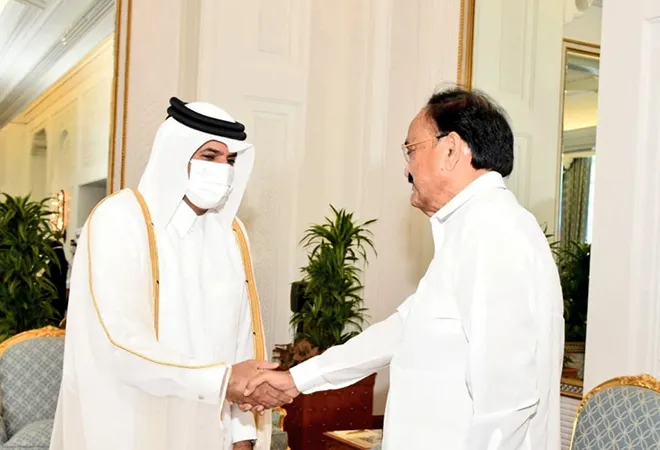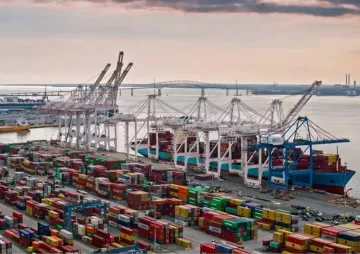
Recent
comments made by the party spokesperson of the Bharatiya Janata Party (BJP) in New Delhi regarding Prophet Mohammed have cascaded into a multi-layered international incident. Islamic nations in the Middle East and beyond publicly condemned these views, and the Indian government distanced itself from the party functionaries in question. The BJP leadership suspended them from their positions, whilst diplomats worked overtime to control the damage.
More than 15 Islamic nations, most of which maintain very good ties with New Delhi, released statements and summoned Indian envoys regarding the comments made against the Prophet. Iran’s Foreign Minister, Hossein Amir-Abdollahian who
began his long-awaited five-day visit to India, raised the issue once again with the Indian representatives, overshadowing other important points of discussion such as the situation in Afghanistan, energy security, and so on.
The Gulf and the extended West Asian region have gained significant strategic and economic importance in Indian foreign policy calculus over the past few years.
The Gulf–India freeway
The rush to control the situation in New Delhi was palpable. The Gulf and the extended West Asian region have gained significant strategic and economic importance in Indian foreign policy calculus over the past few years. Ironically, some of the most significant
strides made between the region and India has been during the tenure of Prime Minister Narendra Modi. During this period, India’s interests in the Gulf have gone beyond diaspora and oil, with economics, counterterrorism, defence, technology, and other critical aspects of international cooperation witnessing an important boost. This becomes even more impressive considering the significant political and ideological divides between the ruling Gulf monarchies and the right-wing Hindu nationalist bend of the Modi government. However, both sides have navigated these fissures on a government-to-government level well, up until now.
Communal discrepancies in Indian society and politics are not new. However, neither is democratic discourse, which for its overwhelming benefits and rare faults, remains a critical pillar of India’s national design. India’s ties with the Islamic world, particularly in the Persian Gulf, have navigated tectonic events such as the demolition of the Ayodhya Mosque in 1992, the Godhra riots in Gujarat in 2002, and so on with deft diplomacy from both sides taking charge, disallowing relations to spiral and protecting mutually beneficial national interests despite the ideological and theological crevasses. Islamic leaders and muftis worked with India to temper down any fallouts in the Gulf in aftermath of these events, where ex-pat communities from South Asia work in their millions. Fast forward to the 2010s, a rapidly growing Indian economy helped in changing long-standing perceptions that drove Gulf’s foreign policy towards India. This mutually beneficial reality would not have been possible, say in the 1990s, a time when counterterror cooperation was negligible, Gulf’s affinity towards Pakistan, and its interests far superseded those of India, and persons of interest wanted in India for terrorism found refuge in the Gulf easily. In fact, Modi’s win and the coming of a majority government instead of a coalition one were seen verfavourablyly in the Gulf, viewing his ‘top-down’ style of governance as one that is close to how most in the region themselves operate, in their view, leading to less bureaucracy and faster outcomes.
Creating a sinkhole
The diplomatic fallout over comments by BJP spokespersons was not out of the blue. The rapid growth of the internet, social media and the pace of communication technologies have blurred lines between official governmental positioning on issues and events that are playing out on the ground. The diplomacy filter has limitations today, as control of official narratives and counter-narratives gets even more diluted as we move forward in a hyper-connected world. Government positioning means little if video and audio of events are directly available, and are shared via platforms, reaching thousands within minutes. In Gulf states, this is what happened, as the video of the spokespersons’ comments on the Prophet spread rapidly with help of certain neighbouring states. India’s response, via statements released by its embassies, eased diplomatic tensions, but a level of damage on a public level was already accomplished.
Islamic leaders and muftis worked with India to temper down any fallouts in the Gulf in aftermath of these events, where ex-pat communities from South Asia work in their millions.
Previous cases of
anti-Muslim posts on social media, particularly by expats living in the region, had prompted sober yet notable responses from the Gulf states. Over the years, some Indians have
even been deported from the United Arab Emirates (UAE) for posting hateful content online, and this was despite Indian embassies in the region asking its nationals working across this geography to be mindful of their online activities. However, Gulf nations did not escalate these beyond seeing them as aberrations, and not in light of their larger relations with New Delhi. However, this is an issue that needs attention, more so now than ever.
The most damaging part here is that the status-quo breaking moment came from a party functionary, and not a member of the ‘uninformed’ public. The realisation that what is said domestically travels as much internationally, and the simple social arithmetic of words having consequences, should not have been ignored within the designs of the party’s communication apparatus. Commentary on the Prophet represents a red line in most parts of West Asia, which usually invokes responses from various quarters of the Islamic world. Communal violence by itself has rarely been picked up as a matter of bilateral tension by Gulf states with India, similar to them not picking up the issue of Xinjiang and Uyghur Muslims with China.
…and the geopolitics of it
There was a geopolitical component to the scale of the reaction to this crisis as well. Qatar was probably the first country to raise its voice on the statements made by the BJP politicians. The reasons for Qatar taking the first step could be many, and even finding it important as having to react to a statement degrading the Prophet. However, there are also intra-Gulf rivalries involved in how this incident eventually shaped up. Once Doha took the first step, it was inevitable that other regional powers such as Saudi Arabia and the UAE may well have to follow suit, and not be seen as maintaining silence when other Islamic nations had started raising their voices. This is seen by the often tepid and balanced statements by some countries, where while criticising the Indian political narrative, also commended the government’s swift actions in suspending those who had made the remarks, with Indian statements going as far as calling the spokespersons in question as “
fringe elements”. Another previous example is from October 2021, when the Kuwaiti assembly
reportedly condemned a communal incident in India. However, this did not become a region-wide phenomenon at the time.
The realisation that what is said domestically travels as much internationally, and the simple social arithmetic of words having consequences, should not have been ignored within the designs of the party’s communication apparatus.
Qatar’s relationship with regional powerhouses in Riyadh and Abu Dhabi has fundamentally changed over the past few years. Despite the economic blockade against it ending in January 2021, Doha had fundamentally shifted its economic and strategic thinking, getting closer to Iran and Turkey, shoring up its domestic economic strength on the back of natural gas, and taking a more independent stance on regional and international issues. For example, while the Abraham Accords normalised relations between Israel and a set of Arab states led by the UAE, and even Saudi Arabia has
significantly increased its public outreach to the majority Jewish state, Qatar has tended to take a more independent view, continuing to support and raise calls for the Palestinian cause as voices for the same from Saudi, UAE, and others get diluted. It is possible that, like before, Gulf states would have raised the issue of the statements made in India privately, or maximum via the Organization of Islamic Cooperation (OIC), had Doha not decided to raise this issue on public forums.
Conclusion
Despite potential geopolitical compulsions pushing some Gulf states to also make statements in the footsteps of Doha, the entire episode cannot be hidden behind whataboutery. The fact remains that this experience should be a learning curve for New Delhi, that selling a political narrative domestically that is separate from the one promoted internationally, in an age of hyper-connectivity has severe limitations, with such duplicity prone to be called out on the international stage. However, the Gulf states by design are also not accustomed to no-hold-barred debates on religion. Similar reactions have also come across following
comments made in Europe and the US previously as well. Much like examples from the past, this crisis as well is not expected to challenge the strong fundamentals of the civilizational foundations of India–Gulf relations.
The views expressed above belong to the author(s). ORF research and analyses now available on Telegram! Click here to access our curated content — blogs, longforms and interviews.



 Recent
Recent  PREV
PREV


